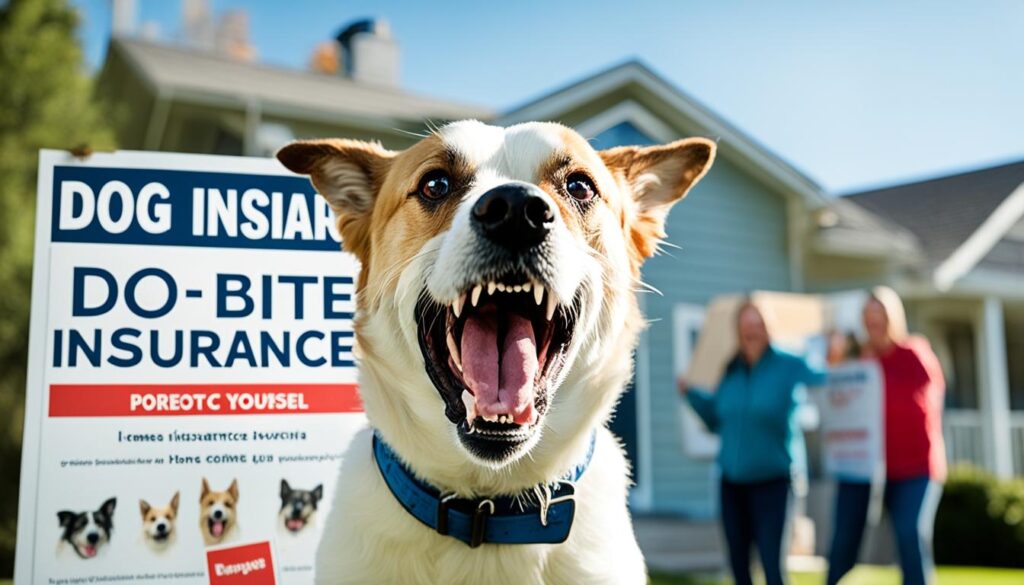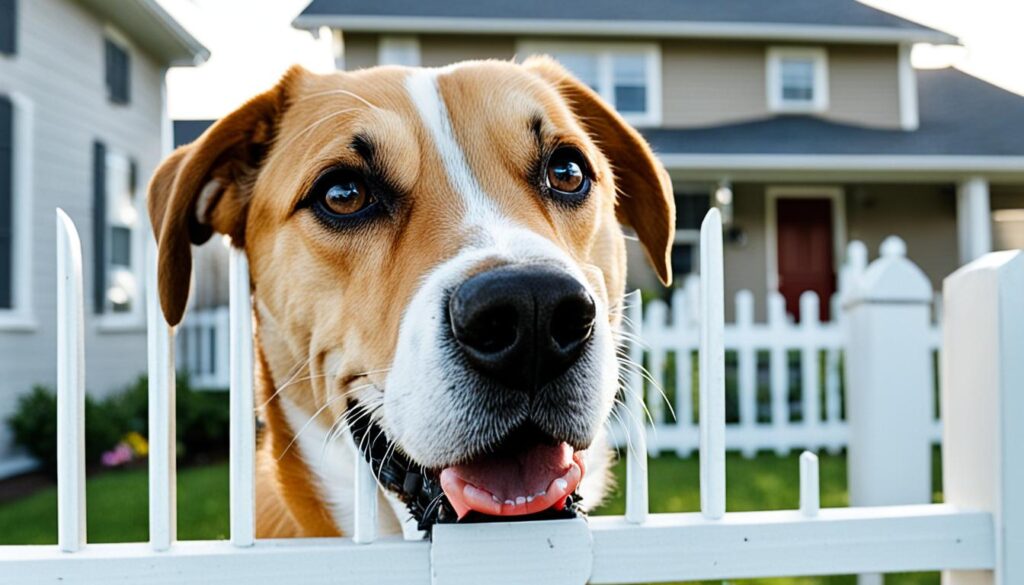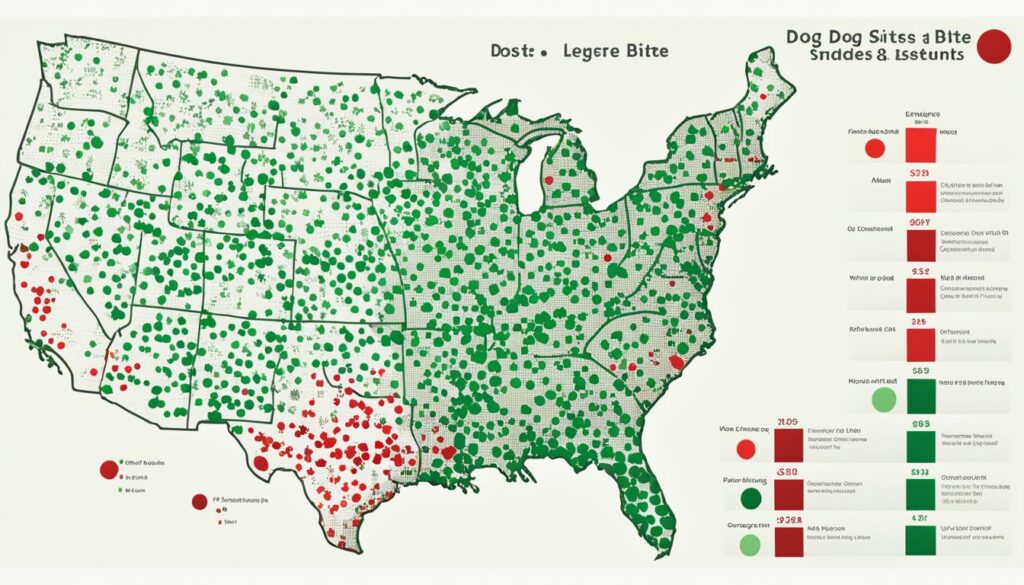In 2023, the average claim for dog bites and injuries was about $58,500. This shows how serious dog bites can be. If a dog bites someone at home, it can cause big problems.
Homeowners insurance often covers these issues. It has parts for liability and medical payments. This helps cover the costs of a dog bite.
Key Takeaways
- The average liability claim for dog bites and other dog-related injuries was about $58,500 in 2023.
- Homeowners insurance policies typically provide liability coverage for dog bites ranging from $100,000 to $500,000.
- Medical payments coverage under homeowners insurance policies usually ranges between $1,000 and $5,000 for minor dog bite injuries.
- Some insurers have breed restrictions that can impact coverage, while others focus on a dog’s bite history instead.
- Landlords can be held liable for dog bite incidents involving their tenants’ pets in certain cases.
Understanding Dog Bite Liability Insurance
If someone in your home gets bitten by your dog, the costs can add up fast. That’s why dog bite liability insurance is important. There’s no single “dog bite insurance” policy. Instead, dog bites are usually covered by your homeowner’s or renter’s insurance.
What is Dog Bite Liability Insurance?
Dog bite liability insurance helps cover you if your dog bites someone and you’re legally responsible. If your dog bites someone and they get hurt, your insurance will usually pay for their medical bills and legal costs. This is true as long as the bite wasn’t in a business place.
The Role of Homeowners Insurance
Homeowners insurance is key for insuring dog bites. It starts at $100,000 but can go up to $300,000 or $500,000 for more coverage. Renters insurance also covers dog bites, helping those who don’t own their homes.
On average, homeowners insurance costs $1,915 a year, while renters insurance is about $168 a year. But, the cost of dog liability insurance can change a lot. It depends on the dog’s age, breed, history, and size. Policies start around $125 a year for coverage from $50,000 to $100,000.
It’s important for pet owners to know about dog bite liability insurance and how it fits with homeowners or renters insurance. This coverage can help pay for medical bills, legal fees, and any compensation owed to the victim.
Personal Liability Coverage for Dog Bites
If your dog bites someone, knowing about personal liability coverage is key. This part of your homeowners or renters insurance helps cover claims from dog incidents. It protects you and the person who got bitten.
In 2022, dog bites led to $1.136 billion in claims for homeowners insurers. There were 17,597 claims, down by 2.2% from the year before. But, the average cost per claim jumped by 28.8% to $64,555, showing the rising costs of these incidents.
Your insurance usually covers dog bite claims, with limits from $100,000 to $500,000. This coverage pays for injuries you’re legally responsible for. It covers medical bills and legal fees. There’s also a no-fault Medical Payments coverage, from $1,000 to $5,000, for medical costs.
To get more protection, consider an umbrella policy. These policies have higher limits, from $1 million to $10 million. They add an extra layer of financial safety for dog incidents.
Some insurers won’t cover homeowners with certain dangerous dog breeds, like pit bulls. This is because there are more claims. In these cases, you might need special dog bite liability insurance for enough coverage.

Personal liability coverage is key in case of a dog bite. It helps cover costs and shields you from financial loss. Knowing what’s covered and what’s not helps you prepare for dog-related claims.
Medical Payments Coverage for Dog Bite Injuries
Homeowners insurance also covers medical payments, not just personal liability. This coverage pays for minor medical costs from a dog bite, even if you’re not legally to blame. It usually covers between $1,000 to $5,000 per incident. This is useful if someone gets a few stitches from your dog but doesn’t want to sue you.
This coverage is different from the liability limits. It helps pay for medical care without needing to file a claim.
How Medical Payments Coverage Works
Medical payments coverage for dog bite injuries is between $1,000 and $5,000. It covers medical costs like stitches without needing to file a claim. This coverage is no-fault, meaning it pays regardless of who caused the injury.
The average claim for dog bites and injuries was about $58,500 in 2023, says the Insurance Information Institute and State Farm. Homeowners insurance often covers between $100,000 and $500,000 for dog bite incidents. This gives pet owners extra protection for serious injuries or lawsuits.
Remember, medical payments coverage is different from liability limits. If medical costs go over the coverage, liability coverage can help. Knowing how both coverages work helps pet owners make sure they’re well-protected.
“Roughly 36 states have strict liability laws holding dog owners accountable for their pet’s actions, with exceptions based on provocation or self-defense.”
If a Person in Your House Was Bitten by Your Dog Which Type of Insurance
If someone in your home gets bitten by your dog, you might wonder which insurance covers it. Your homeowners insurance won’t help in this situation. It’s meant for injuries to people outside your home. You’ll need to use the injured person’s health insurance or yours to pay for medical costs.
Also, the medical payments part of your homeowners insurance doesn’t cover family members. It’s for people who aren’t your family or living with you.
- If a person in your house was bitten by your dog, you would need to use their health insurance or your own health insurance to cover the medical expenses.
- Homeowners insurance liability and medical payments coverage do not apply to injuries to members of your own household.
- Liability insurance is designed to cover injuries to individuals outside of your household, such as guests or neighbors.
For dog bites within your home, you might want to look into dog bite liability insurance or an umbrella insurance policy. These can help pay for medical bills, legal fees, and settlements from lawsuits.

“Owning a dog may or may not increase your home insurance premium, with exceptions for blacklisted breeds or dogs with a history of aggression.”
Make sure to check your homeowners or renters insurance to see what it covers for dog bites. Sometimes, you’ll need extra coverage or a special policy to be fully protected if your dog bites someone in your household.
Exclusions and Limitations
When looking into dog bite liability insurance, there are exclusions and limitations that can affect coverage. Breed-specific exclusions are common. Some insurers cover dog bites no matter the breed, but others exclude breeds like pit bulls, Doberman pinschers, Rottweilers, and wolf hybrids.
Insurers might not cover if the dog has bitten before or damaged property. Breed restrictions and past incidents make it hard for pet owners to find insurance if their dog is on a list. But, some states stop insurers from denying coverage just because of a dog’s breed, helping protect pet owners.
Breed Restrictions
Some dog breeds are seen as more aggressive, leading insurers to exclude them from coverage. These exclusions can be strict, with some insurers not covering certain breeds at all. Others might review each case. The breeds most often excluded are:
- Pit bulls
- Doberman pinschers
- Rottweilers
- German shepherds
- Chows
- Akitas
- Wolf hybrids
Pet owners with these breeds might struggle to get homeowners or renters insurance. They might pay more for coverage or need a special policy for liability related to their dog’s breed.
Pet owners should check their insurance policies for breed restrictions or exclusions. Knowing about these can help them make better insurance choices and lower risks for owning a high-risk dog.
Umbrella Insurance for Additional Protection
If you’re worried your homeowners insurance might not cover a serious dog bite, think about umbrella insurance. This type of insurance adds more liability coverage on top of what you already have. It usually starts at $1 million. This extra coverage can help if a lawsuit from a dog bite goes over your regular insurance limits.
Umbrella insurance costs between $150 to $300 a year. The price goes up by about $50 for each extra $1 million in coverage. People with more risk factors, like owning more homes or cars, might pay more.
Umbrella insurance is a smart way to increase your liability protection. Regular homeowners insurance usually covers up to $100,000. Auto insurance varies by state but often starts at $25,000 per person and $50,000 for an accident. Umbrella insurance covers more than these limits, giving you extra protection for big incidents like a severe dog bite.
| Coverage Limit | Approximate Annual Cost |
|---|---|
| $1 million | $150 – $300 |
| Each additional $1 million | +$50 |
To get umbrella insurance, you usually need to have the highest liability coverage on your main policies (homeowners and auto). This makes sure the umbrella policy only starts when your main coverage is used up.
Umbrella insurance is great for people at higher risk, like those with rental properties, teenage drivers, pools, or certain household items. It adds an extra layer of protection for your assets and financial health. This includes if a person in your house was bitten by your dog.

“Umbrella insurance is relatively inexpensive compared to other types of insurance, considering the extensive coverage it provides.”
Landlord Responsibility for Tenant’s Dog Bites
Landlords can be liable if a tenant’s dog bites someone on their property. This is true if they knew the dog was dangerous but didn’t do anything about it. To protect themselves, landlords might ask tenants to have their own renters liability insurance. They can also reduce risk by making sure gates and fences are secure and posting signs about aggressive dogs.
Usually, landlords aren’t liable for dog bites from tenants. Courts only hold landlords responsible if they knew the dog was dangerous and could have removed it but didn’t. Even if a dog bites someone off the rental property, the landlord might still be liable.
If a landlord controls a tenant’s dog, they could be liable for any injuries it causes. Their liability insurance might cover these costs. But, laws about landlord liability for dog bites vary by state.
Landlords can be liable if they knew a dog was dangerous and didn’t take action. But, they’re usually not liable if they didn’t know the dog was dangerous before an attack. This shows how important it is for landlords to be aware of a dog’s history.
| Landlord Liability Factors | Potential Impact |
|---|---|
| Awareness of Dangerous Dog | Landlords may be liable if they knew the dog was dangerous and failed to address it |
| Control over Dog or Premises | Landlords who exercise control over a tenant’s dog may be liable for its actions |
| State Laws and Regulations | Liability laws vary by state, with some states not imposing liability on landlords |
| Tenant’s Renters Insurance | Landlords may require tenants to carry liability insurance to protect themselves |
Even if a dog attack happens off the landlord’s property, they might still be liable. This is true if they were controlling the dog or knew it was dangerous. Dog bites can cause serious injuries, leading to big settlements for victims. These settlements often cover both economic and non-economic damages.
In some cases, a landlord can be liable for a dog attack even if it happens off their property. This is true if they knew the dog was vicious and it escaped. For example, in Wright v. Schum (Nev. 1989), a court found a hotel liable for a guest’s injury from a dangerous dog.
Landlords might also be liable if a tenant’s dog from a neighboring property bites someone. The idea of a warranty of habitability might make landlords responsible for tenant behavior, like owning dangerous dogs. Knowing these details can help landlords take steps to reduce risks and protect themselves from liability.
Preventing Dog Bite Incidents
The best way to avoid dog bite incidents is through responsible pet ownership. This means training and socializing your dog from a young age. It also means keeping your pet under control when they are around others.
Training your dog to obey commands like “sit,” “stay,” and “come” is key. Also, expose your dog to different people and places. This helps them become calm and less likely to bite.
Being a responsible pet owner also means keeping your dog on a leash in public. Make sure your home is safe for your dog to prevent them from getting out and biting someone. Always watch your dog when they meet others, especially kids. This way, you can lower the chance of a dog bite incident and keep everyone safe.
Training and Socialization
Training and socializing your dog are crucial to prevent bites. Start training early with commands like “sit,” “stay,” and “come.” Introduce your dog to various people, animals, and places to make them well-adjusted and calm.
For the best training and socialization advice, talk to a professional trainer or a vet. They can guide you on how to make your dog friendly and well-behaved.
Responsible Pet Ownership
As a responsible pet owner, always keep your dog under control. Use a leash in public and make sure your yard is safe to stop your dog from running off and biting someone. Watch how your dog acts with others, especially kids, and don’t leave them alone with people they don’t know.
By doing these things, you can greatly lower the risk of a dog bite incident. This keeps your pet and others safe.
| State | Dog Bite Claims (2023) | Average Cost per Claim (2023) |
|---|---|---|
| California | 2,104 | $58,545 |
| Illinois | 1,287 | $73,797 |
| Texas | 1,845 | $61,245 |
| Florida | 1,650 | $65,912 |
| New York | 1,209 | $59,678 |
“Proper training and socialization are essential for preventing dog bites. Start obedience training with your dog at an early age, and expose them to a variety of people and environments to help them become well-adjusted and less likely to display aggressive behavior.”

State Laws and Regulations
When it comes to if a person in your house was bitten by your dog which type of insurance, laws vary by state. Some states say insurers can’t deny dog bite liability insurance or homeowners insurance coverage just because of a dog’s breed. Other states set rules for how much insurance a dog owner must have.
It’s key for pet owners to know the laws in their state. These laws affect insurance coverage and pet ownership duties. Knowing these rules helps ensure you’re protected against canine incident claims and animal attack compensation situations.
Breed-Specific Legislation
Some states have breed-specific legislation (BSL) focusing on breeds like Pit Bulls, Rottweilers, and Doberman Pinschers. These laws might limit or ban these breeds, or require owners to have special insurance or training.
But, the success of BSL in lowering dog bite incidents and pet ownership responsibility is not clear. Some states have changed or removed these laws in recent years.
Responsible Pet Ownership Laws
- Many states have laws making dog owners responsible for their pets. These laws often include domestic animal injury protection or household pet insurance policies.
- These laws might require owners to have a certain amount of liability insurance. Or, they might ask owners to prevent their dogs from harming others.
- If owners don’t follow these laws, they could face fines, legal trouble, or even have their dog taken away.
Knowing the laws and regulations in your state helps protect you, your family, and your household pets from dog bite issues.
Filing a Dog Bite Claim
If your dog bites someone and they want compensation, you must file a claim with your homeowners insurance. You’ll need to provide lots of evidence and documentation for your case.
Documentation and Evidence
To make a strong dog bite claim, you need to collect and send in several important things, such as:
- The victim’s medical records showing their injuries
- Police reports about the incident
- Details of what happened before the bite, and what you did to try to stop it
- Proof your dog is up-to-date on shots and licensed
- Info on your dog’s training and how they interact with others
Your insurance company will look into the claim to see if you’re legally responsible for the bite. Giving them all the details and working with them can help get a fair outcome.
Remember, homeowners insurance might cover medical bills and legal costs if your dog bites someone. Being a responsible pet owner and having the right insurance protects you and your dog.
“Careful record-keeping and cooperation with the claims process can help ensure a fair resolution for a dog bite incident.”

Being organized and proactive helps you handle the claim well and reduces the financial and legal stress on you and your family. Always put the health and safety of everyone first.
Dog Bite Statistics and Trends
Owning a dog means you have big responsibilities and could face legal issues. The Insurance Information Institute says dog-related claims cost insurers over $1 billion in 2022. The average claim for dog bites was about $58,500 in 2023. With over 38% of American homes having dogs, it’s key to know how often and how serious dog bites can be for owners and insurers.
Some important dog bite facts and trends to think about:
- Dog bites are the second-most common reason for homeowner’s insurance claims, making up over one-third of all claims.
- Kids aged 5 to 9 are most likely to get bitten by dogs.
- Some breeds like pit bulls and rottweilers are linked to more deadly dog attacks, but any dog can bite or attack.
- There are about 316,000 dog bite visits to emergency rooms every year in the U.S., staying steady over the last ten years.
- These bites can lead to big medical bills, with the average claim over $50,000 in recent years.
| Year | Average Liability Claim Cost | Total Dog Bite Liability Claims |
|---|---|---|
| 2022 | $58,500 | $1,000,000,000 |
| 2021 | $54,700 | $950,000,000 |
| 2020 | $50,245 | $900,000,000 |
The data shows how dog bites can cost a lot for homeowners and insurers. Knowing these trends helps pet owners make smart choices about dog bite liability insurance, homeowners insurance coverage, and other ways to protect themselves and their families from dog-related issues.
“Dog ownership comes with big responsibilities and possible legal issues. It’s key for pet owners to stay updated on dog bite stats and trends to make smart choices and protect their finances.”

Conclusion
Having a dog means you face big risks, and homeowners insurance helps cover these risks. It includes personal liability and medical payments coverage. This coverage protects you if your dog bites someone, whether at home or not. Knowing what your dog bite liability insurance covers is key to being prepared.
Being a good pet owner can lower the chance of a dog bite. Training, socializing your dog, and following local rules help a lot. Also, having household pet insurance policies that cover domestic animal injury protection can ease your worries.
Being a dog owner brings both happiness and duties. By knowing how homeowners insurance covers dog bites and preventing bites, you can enjoy your dog’s company. This way, you also reduce the risk of legal and financial problems.
FAQ
What is dog bite liability insurance?
How does homeowners insurance cover dog bites?
What is medical payments coverage for dog bite injuries?
If a member of my household is bitten by my dog, is that covered by homeowners insurance?
Are certain dog breeds excluded from homeowners insurance coverage?
How can umbrella insurance provide additional protection for dog bites?
FAQ
What is dog bite liability insurance?
There is no such thing as a standalone “dog bite insurance” policy. Instead, dog bites are covered under the personal liability part of a homeowners insurance policy.
How does homeowners insurance cover dog bites?
The personal liability coverage in a homeowners policy protects against dog bite incidents. It pays for injuries and legal costs if you’re legally responsible.
What is medical payments coverage for dog bite injuries?
Homeowners insurance also offers medical payments coverage for dog bites. This coverage pays for minor medical costs, even if you’re not legally responsible.
If a member of my household is bitten by my dog, is that covered by homeowners insurance?
If your household member is bitten by your dog, your insurance won’t cover it. You or the injured person’s health insurance will need to pay for the medical costs.
Are certain dog breeds excluded from homeowners insurance coverage?
Some insurers cover dog bites regardless of breed. But, others might not cover certain breeds like pit bulls, Doberman pinschers, Rottweilers, and wolf hybrids.
How can umbrella insurance provide additional protection for dog bites?
If your homeowners insurance limits might not cover a serious dog bite, consider umbrella insurance. It adds an extra layer of coverage, starting at
FAQ
What is dog bite liability insurance?
There is no such thing as a standalone “dog bite insurance” policy. Instead, dog bites are covered under the personal liability part of a homeowners insurance policy.
How does homeowners insurance cover dog bites?
The personal liability coverage in a homeowners policy protects against dog bite incidents. It pays for injuries and legal costs if you’re legally responsible.
What is medical payments coverage for dog bite injuries?
Homeowners insurance also offers medical payments coverage for dog bites. This coverage pays for minor medical costs, even if you’re not legally responsible.
If a member of my household is bitten by my dog, is that covered by homeowners insurance?
If your household member is bitten by your dog, your insurance won’t cover it. You or the injured person’s health insurance will need to pay for the medical costs.
Are certain dog breeds excluded from homeowners insurance coverage?
Some insurers cover dog bites regardless of breed. But, others might not cover certain breeds like pit bulls, Doberman pinschers, Rottweilers, and wolf hybrids.
How can umbrella insurance provide additional protection for dog bites?
If your homeowners insurance limits might not cover a serious dog bite, consider umbrella insurance. It adds an extra layer of coverage, starting at $1 million.
Can landlords be liable for a tenant’s dog biting someone?
Yes, landlords can be liable if a tenant’s dog bites someone on their property. This is true if the landlord knew the dog was dangerous and didn’t fix the issue.
How can I prevent dog bite incidents?
To prevent dog bites, be a responsible pet owner. Train and socialize your dog, keep control of it around others, and secure your pet at home.
How do state laws and regulations impact dog bite insurance coverage?
State laws affect dog bite insurance coverage a lot. Some states stop insurers from denying coverage based on a dog’s breed. Others require dog owners to have a certain amount of liability insurance.
What is the process for filing a dog bite claim?
To file a dog bite claim, you need to contact your homeowners insurance. You’ll need to provide evidence like medical records, police reports, and details about the incident.
million.
Can landlords be liable for a tenant’s dog biting someone?
Yes, landlords can be liable if a tenant’s dog bites someone on their property. This is true if the landlord knew the dog was dangerous and didn’t fix the issue.
How can I prevent dog bite incidents?
To prevent dog bites, be a responsible pet owner. Train and socialize your dog, keep control of it around others, and secure your pet at home.
How do state laws and regulations impact dog bite insurance coverage?
State laws affect dog bite insurance coverage a lot. Some states stop insurers from denying coverage based on a dog’s breed. Others require dog owners to have a certain amount of liability insurance.
What is the process for filing a dog bite claim?
To file a dog bite claim, you need to contact your homeowners insurance. You’ll need to provide evidence like medical records, police reports, and details about the incident.

